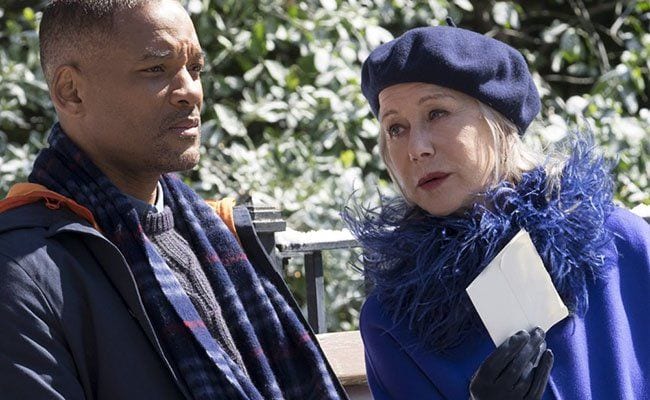
Every awards season has a favorite whipping boy. A movie so earnest — so smug in its own self-righteousness — that audiences and critics can unite in a chorus of disdain. This season’s sacrificial lamb is Collateral Beauty, and it’s one of the more obvious prestige grabs to hit theaters in quite some time. As if inspired by the insipid title (what the hell is collateral beauty, anyway?), director David Frankel’s saccharine drama about love and loss will stop at nothing to make you cry.
The most infuriating thing about Collateral Beauty is that it has the potential to actually work. For starters, the subject matter is deeply affecting. If you haven’t yet been touched by cancer, you almost certainly know someone who has. Terminal cancer is a cruel bully that takes away your humanity before it finally has the decency to kill you. Watching characters cope with the loss of a loved one, especially a child, is a singular reminder to appreciate the people in your life. Each of the actors in this strong troupe takes that responsibility very seriously, catapulting this sanctimonious tripe to an almost respectable level at times.
Leading the A-list charge is Will Smith, who stars as Howard; a rapacious New York advertising executive with a heart of gold. He preaches to his awestruck employees about capitalizing on “Love, life, and death” to help sell their vanity products. Of course, the script isn’t brave enough to portray the harsh corporate reality of selling people crap that they don’t need, so Howard is portrayed as more of a motivational figure. He’s kind of a bizarre mixture of Leonardo DiCaprio’s Jordan Belfort in The Wolf of Wall Street and self-help guru Tony Robbins.
Fast forward three years and Howard is mourning the loss of his six-year-old daughter to cancer. His days of being the “Guru who terrifies Madison Avenue” are long gone, and his once-dynamic company is hanging by a thread. Now, Howard spends his workday building elaborate domino cities in his office, only to topple them at a moment’s notice (symbolism alert!!). He occasionally leaves the office to weave his bike through traffic like a suicidal courier. This once great communicator is so paralyzed by grief that he can’t even speak his daughter’s name.
There are moments of quiet power sprinkled throughout Howard’s journey to find (or avoid) closure. When he wanders into a support meeting for other parents who lost children to cancer, for example, the stories are painful and real. The group’s facilitator, Madeleine (Naomie Harris), shares her own story, including a note penned by her lovelorn ex-husband that tragically laments, “If only we could be strangers again.” It would take a heart of stone to be left unmoved by these remarkable moments of vulnerability and honesty.
The problem lies in Frankel’s (Hope Springs, Marley & Me) refusal to let Howard’s suffering be a conduit for genuine catharsis. Instead, he smothers these authentic moments in melodramatic subplots and clever twists that only distract from the central drama. In fact, there are so many subplots in Collateral Beauty that it’s hard to imagine a screenwriter, let alone the audience, keeping them all straight.
Take, for example, the primary plot that drives this bus straight off the cliff. Howard’s partner and friend, Whit (Edward Norton), is desperate to sell the floundering company, so he enlists the help of co-workers Claire (Kate Winslet) and Simon (Michael Peña) to prove that Howard is mentally incompetent. In effect, Whit “gaslights” Howard into believing that he’s literally speaking to the concepts of Love (Keira Knightley), Time (Jacob Latimore), and Death (Helen Mirren).
Yeah, with “friends” like Whit, who needs cancer to ruin their life?
We are wholly independent, with no corporate backers.
We can’t survive without your support.
As if this plot weren’t preposterous enough, each secondary character gets a personal dilemma to further raise the emotional ante. Whit has an estranged daughter who won’t speak to him (there’s a shocker!), Claire spends her days pining for the baby she never had, and Simon has his own family cancer crisis to battle. These competing story threads give Frankel and his screenwriter (Allan Loeb) ample opportunity to make big speeches and forcibly extract a few tears. The end result is a film that’s so obsessed with stringing together ‘Oscar moments’ that it dilutes everything to the point of nonsense.
These actors deserve so much better. Smith pours his soul into this role, only to be betrayed by not one, but two surprise twists that will leave you with more heartburn than heartache. Mirren and Peña work so well together that you wish they could be magically teleported to a different (and better) movie.
Almost everything about Collateral Beauty is overbearing. From a clever script that can’t stop congratulating itself to Theodore Shapiro’s treacly score, this film simply doesn’t trust you to formulate your own emotional responses. Perhaps it’s unfair to compare this Hollywood clunker to an indie darling like Manchester by the Sea, but both deal with crippling emotional pain, albeit in markedly different ways. The difference between these two films is a matter of respect, both for the audience and for the subject matter. It’s likely that the makers of Collateral Beauty were sincere in their objectives, but that certainly didn’t translate to a final product that nauseates and manipulates in equal measure.

